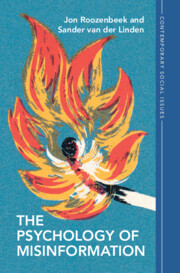Book contents
- The Psychology of Misinformation
- Contemporary Social Issues
- The Psychology of Misinformation
- Copyright page
- Contents
- Figures
- Acknowledgments
- Prologue
- Part I Setting the Stage
- Part II Misinformation Belief and Spread
- Part III Countering Misinformation
- 6 Laws and Regulation
- 7 Interventions to Combat Misinformation
- 8 Reflecting on Our Own Program of Research
- References
- Index
8 - Reflecting on Our Own Program of Research
from Part III - Countering Misinformation
Published online by Cambridge University Press: 28 March 2024
- The Psychology of Misinformation
- Contemporary Social Issues
- The Psychology of Misinformation
- Copyright page
- Contents
- Figures
- Acknowledgments
- Prologue
- Part I Setting the Stage
- Part II Misinformation Belief and Spread
- Part III Countering Misinformation
- 6 Laws and Regulation
- 7 Interventions to Combat Misinformation
- 8 Reflecting on Our Own Program of Research
- References
- Index
Summary
This chapter discusses the ups and downs of the authors’ program of research on misinformation, which has involved creating “fake news” games and videos to reduce susceptibility to various common types of manipulation. Despite some successes, there are also substantial nuances to their work: limited cross-cultural generalizability, in some cases an unintentional effect of game-based interventions on people’s evaluation of “real news” or non-misinformation, a negligible impact of such interventions on people’s social media sharing behavior, and perhaps most importantly the (potentially rapid) disappearance of the intervention effect over time and the presence of testing effects: actively rehearsing the lessons from the interventions (e.g, about how to spot a particular manipulation technique) appears to be important for their longevity and effectiveness. These limitations have substantial implications for anyone who wants to design (and test) an intervention to counter misinformation.
- Type
- Chapter
- Information
- The Psychology of Misinformation , pp. 116 - 137Publisher: Cambridge University PressPrint publication year: 2024



